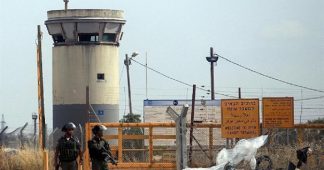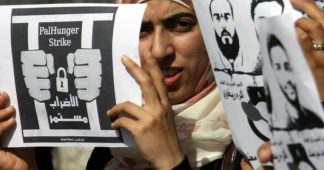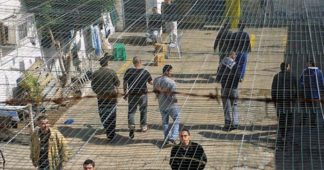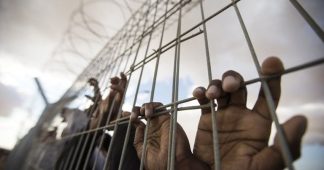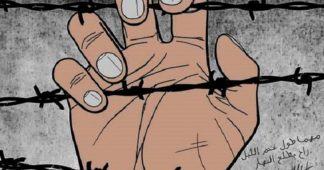Palestinian political prisoners entered 18th day of hunger strike, the day that standing may become difficult or even impossible. On 3 May 2017, significant Palestinian political leaders declared they will be joining the mass hunger strike. A joint press conference held in Ramallah on the same day declared that imprisoned Popular Front for the Liberation of Palestine (PFLP) General Secretary Ahmad Sa’adat will join the strike along with dozens of leaders from several Palestinian political factions such as Nael Barghouthi, Hassan Salameh, Ahed Abu Ghoulmeh, Abbas al-Sayed, Ziad Bseiso, Basem al-Khandakji, Mohammed al-Malah, Tamim Salem, Mahmoud Issa, and Said al-Tubasi.
Over 1500 Palestinian political prisoners and detainees held in Israeli prisons and detention centers began an open hunger strike on 17 April 2017. The call for a hunger strike came as a result of Israeli’s policies and practices towards political prisoners. The hunger striking prisoners’ demands include: an end to the transfer of Palestinian prisoners from the occupied Palestinian territory (OPT) into prisons in Israel; regular family visits; proper medical care; an end to Israel’s practice of detaining Palestinians without charge or trial in so-called administrative detentions; and stopping the use of solitary confinement.
Punitive measures imposed on hunger strikers have included: the denial of family visits; denial of recreational time; denial of access to the “canteen” (prison store); prohibition from participating in group prayers on Fridays; seizure of salt during the first days of the strike; and.
As a result of the hunger strike, Palestinian prisoners have been subjected to violent and coercive measures and policies by Israeli Prison Service and special units to push prisoners and detainees to end their hunger strikes. Addameer Prisoner Support & Human rights Association visited non-striking prisoners in Remon and Meggido prison on 4 May 2017.
The non-striking prisoners informed Addameer’s attorney that Israeli Special unit forces regularly storm and raid prisoners’ sections confiscating personal belongings; only one blanket has been kept for each prisoner and one set of clothing in addition to the “Shabas clothing” or prison uniform. In all of the prisons, strikers are isolated, denied family visits, legal visits, and group prayers; there are multiple reports of confiscation of salt, and prisoners were provided with plastic cups in order to drink from the tap rather than the usually provided drinking water. Additionally, the relocation of several prisoners to other prisons has exacerbated their already deteriorating health due to a lengthy ‘transfer’ process. Hunger strikers have also been prohibited from washing their personal clothing and undergarments. In reaction to this, prisoners boycotted medical examinations to check their heartbeat, blood pressure, and weight.
Due to Israel’s ban of attorney visits, Addameer has not been able to track development in the strikers’ health and daily conditions. However, Adalah, the Prisoners’ Affairs Commission and the Prisoners’ Club filed a petition to the Israeli High Court demanding attorney visits to hunger striking prisoners. The petition was approved by the court allowing three attorneys to visit, where each attorney gets to visit two hunger strikers only, that is after getting the approval of the Israeli Prison Service (IPS).
As more prisoners are joining the hunger strike, Addameer Prisoner Support urges supporters of justice around the world to take action to support the Palestinian prisoners whose bodies and lives are on the line for freedom and dignity. Addameer urges all people to organize events in solidarity with the struggle of hunger-striking prisoners and detainees.
